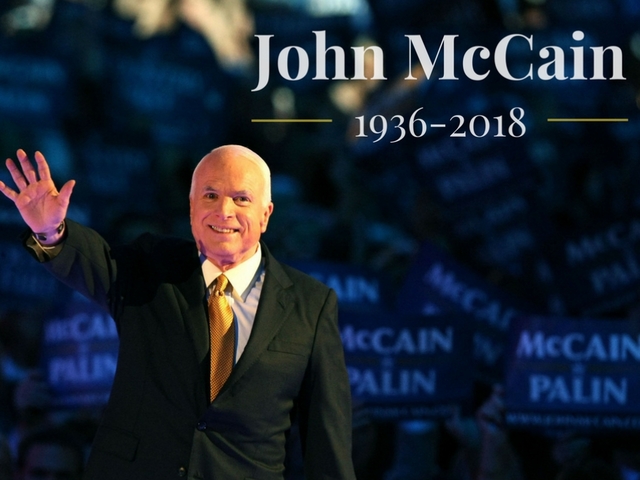Passing of a Legend
September 14, 2018
In mourning of the passing of long standing Senate Republican John McCain, people are now acknowledging the way this political giant has changed the American political landscape. Both political ideologies can concede to the fact McCain had a transformative impact on politics in the United States of America. Even former rivals in the presidential race – George W. Bush and Barack Obama – have offered to deliver his eulogy. Unsurprisingly, the leader of the free world has yet to make a statement on the death, which is conceivable as he previously halted insults of defamation in regard to McCain being captured by the Viet-Cong as a prisoner of war for approximately five years. McCain was one of the only congressional Republicans that actively defied Trump’s policy proposals rather than others like Ted Cruz that disagreed with Trump on fundamental issues in the presidential race, but conformed to his ideas, however this can be attributed to incentivization from lobbying groups, rather than simply his conformity to President Trump. Due to McCain’s partial defiance of Trump, the President angrily labeled McCain as not being a war hero because “[he] likes people that weren’t captured.”
McCain served on the US Senate for about three decades after being a POW in Vietnam. Due to his intense military background, he is known for a voting pattern of continual support for war efforts, giving him the nickname as a “war hawk.” McCain made the consequential, yet, detrimental vote for sending troops to Iraq after 9-11 and still maintained the same level of support even as numerous studies indicate that it was a failed war, which created a surge of terrorism and a failed state. The war, in total, costed nearly 3 trillion dollars, dramatically raising the federal deficit and a factor in the 2008 recession. Even after the failed war strategy, he persisted that more and more troops would solve the problem – later favoring the sending of troops to Afghanistan – which in turn meant he also supported congressional manners for more money appropriation in the defense budget. The war in Afghanistan and Iraq was one of the biggest US diplomatic failures. Upwards of eight thousand US soldiers died and many were sent injured back to the country where healthcare system for vets is rendered worthless and ineffective. In regard to campaign finance laws, his relinquished efforts seemed quasi; he received donations from Charles H. Keating Jr., the owner of a loans company, in the early 80s, and was investigated for external intervention with federal regulators on behalf of Keating. This introduction to campaign finance decades later paved the way for one of the most consequential pieces of legislation in finance laws.
This all came to fruition with the Bipartisan Campaign Reform Act of 2002, which he worked alongside a powerful Democrat – Senator Russ Feingold. Commonly known as McCain-Feingold, the law created transparency and effectively banned the use of soft money – money raised in unlimited amounts by political parties for party building purposes. When the law was effectuated, it made the use of soft money illegal except for limited contributions to state or local parties for voter registration and get-out-the-vote efforts – in size to campaign contributions in federal elections. Their attempt was to seal the loopholes that were expanded in the 70s with the Campaign-Finance Reform. The 70s was a time of frivolous laws that permitted unlimited sums of “soft money” for party building. The Supreme Court case, Buckley v. Valeo, struck down spending limits imposed on candidates and individuals or groups, however, it did uphold the foundation that limited contributions from individuals, disclosure rules, and the act of public financing a campaign. Much of the McCain-Feingold Act sought to reduce these loopholes in federal matters. Also, despite the moral dispositions of his political party, he outright defended then candidate Barack Obama from a insensitive lady who claimed he was an “Arab.” His act of selflessness largerly clarifies what McCain stood for in life: humanity.
Though Mr. McCain made many important decisions that proved to be detrimental to domestic and foreign policy, he will be remembered for more. His dedication to the fundamental theorem of the American creed outweighs all of the work he had done in Senate as a politician. His tenacity and persistence has left an enduring principle in America with the lasting impression of perseverance – a trait he carried from being a POW in Vietnam to battling Brain Cancer. He will be remembered as the standard epitome of a decent being.


